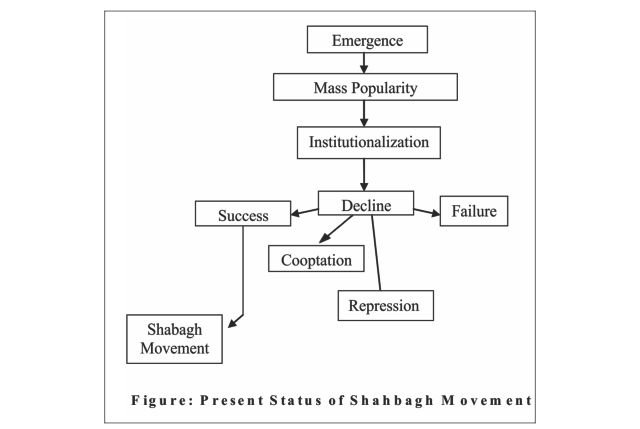Published on The Daily Star
The recent approach of the government towards the Shahbagh movement that emerged as a ‘Social Movement’ causes concern in the people regarding the likely decline of this movement. The article will elaborate whether the movement is in a declining stage or not, based on a theoretical framework.
Basically, social movements have four stages, as mentioned by Jonathan Christiansen which include emergence, mass popularity, formalisation and decline. The people who are in between the political party and interest groups having a clearly identified opponent construct a social movement towards a goal. The participants of the social movement are linked by informal networks and share a collective identity. It enters the second stage when mass people come to join the movement and make it more organised and strategic in its outlook.
The continuation of the movement through arranging several programmes gives it a formal look which increases the political power of the participants than the previous stage to have regular access to political elites.
Finally the last stage of the movement indicates the decline of the movement through success or failure or co-optation by the target groups against whom the movement is directed or repression by the government.
In this context the Shahbagh movement has been started by some bloggers and online activists who got connected by a facebook event demanding capital punishment of Abdul Quader Mollah and others convicted of crimes against humanity during the 1971 Bangladesh Liberation War. Later, the movement spread to other parts of Bangladesh. It reached the second stage very quickly within few days when peoples from various levels came to join and express solidarity with the movement. Consequently it became a people’s movement and has come to be known as ‘Gonojagoron Mancha.’ The movement became formalised within five days when a five-member delegation of Bloggers and Online Activist Network submitted a memorandum to Jatiya Sangsad Speaker Abdul Hamid on February 10 to press home their six-point demand. Since then the ‘Gonojagoron Mancha‘ continues to call several programmes including three minutes of silence, candle lighting, cultural programmes and so on.
Now the symptom says that the movement is on the way to reach the fourth stage. The ‘double standard’ response of the government has made the situation look like this. The prime minister expressed her opinion to stop the movement at the meeting of the Central Executive Committee of the Awami League on Sunday, April 1, 2013 (Prothom Alo, April 2, 2013). On the other hand Abdur Razzak, Minister for food and disaster management said in a talk show in the Independent Television on April 2 that the government is willing to continue its support strategically toward the continuation of the movement and he also said that nothing was uttered against the movement during their meeting! If so then why has not the government released any press note to make it clear that no discussion was held regarding the ‘Gonojagorn Mancha’ during the said meeting?
So it seems that either the government will accept their six-point demands and take necessary steps to fulfil it including banning of Jamaat politics which will make the movement a success, or the government will use measures (sometimes violent) to control or stifle the movement. It can be envisaged by the attitude of the government that it will choose the latter probably, as it seems that the government is not prepared to ban Jamaat politics right now. So the movement can decline through repression by the government as there is no possibility to end the movement through co-optation. Because co-optation can occur if the leaders are motivated by authorities or target groups to redirect their activities and the Shahbagh movement is neither highly dependent on centralised authority nor on a charismatic leader.
Though it is not the right moment to pick the exit point of the movement as the spokesperson of the movement have said that they will not go back until their demands are met. So its better to say that the movement exists in between repression and success (see figure). Because one of the demands has already been met by the amendment of law through which the International Crimes (Tribunals) Act, 1973, now allows the government to appeal against any verdict of the Tribunals. International Crimes Tribunal (ICT) law has now also empowered the Tribunals to try and punish any organisations, including Jamaat-e-Islami, for committing crimes during the Liberation War.
The greatest achievement of this movement is that, through this upraising the people of this country, especially the young generation has got the chance to revisit the proud history of the country with renewed spirit.
The writer is Research Associate, Centre for Policy Dialogue (CPD).



